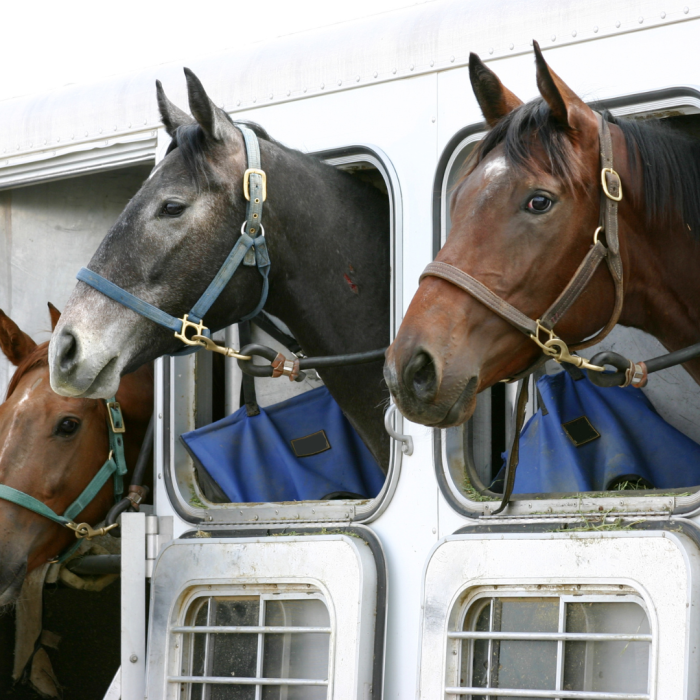
Colic is one of the most common and potentially serious health issues that affects horses. While the term horse colic is simply defined as abdominal pain, colic in horses can range from mild discomfort to life-threatening conditions requiring immediate intervention. Understanding what causes horse colic and how to spot the signs early can make all the difference in ensuring your horse's safety.
What Causes Horse Colic?
Horse colic can occur for many reasons, often related to the horse's digestive system. Common causes include:
Sudden Dietary Changes
Horses have sensitive digestive systems. Switching feeds or introducing lush pasture too quickly can disrupt gut bacteria, leading to gas or impaction.
Sudden Weather Changes
When the weather is hot, horses tend to drink more. If the temperature falls sharply, they may not feel the need to drink as much, which can lead to impaction.
Impaction (Blockage)
Feed, sand, or foreign material can cause a blockage in the intestines, preventing normal digestion and causing severe discomfort.
Gas Build-Up
Excess gas, often from fermenting feed, can stretch the intestines and cause pain. This is sometimes related to high-grain diets, moldy feed, or overeating.
Dehydration
Inadequate water intake can dry out the gut contents, making it harder for the digestive system to function smoothly.
Parasite Infestations
Worms can irritate and damage the intestines, sometimes leading to blockages or inflammation.
Stress or Changes in Routine
Transport, changes in turnout, or even shifts in weather can affect gut motility and trigger colic.
Signs and Symptoms of Colic in Horses
Early recognition is critical to save your horse's life. Common signs include:
- Restlessness or anxiety – pacing, pawing, or shifting weight
- Licking at or biting the flank
- Frequent lying down and getting up
- Rolling or attempting to roll excessively
- Loss of appetite
- Reduced manure output or changes in consistency
- Sweating without exertion
- Rapid breathing or increased heart rate
- Depression or lethargy
Horse Colic Prevention Tips
While not all horse colic is preventable, you can reduce the risk by:
Maintaining a consistent feeding schedule and providing fresh hay
Horses have delicate digestive systems that function best with routine, so feeding them at the same times each day reduces the risk of digestive upset caused by sudden changes. Sudden alterations in feeding times or amounts can disrupt the balance of gut microbes, potentially leading to discomfort or more serious gastrointestinal issues.
Making diet changes gradually over 7–10 days
Whether you're switching grain brands, introducing a new type of hay, or transitioning from pasture to stored feed, it's essential to do so in small, incremental steps. Gradually increasing the proportion of the new feed while decreasing the old allows the digestive system to adapt and helps maintain healthy gut function.
Ensuring access to fresh, clean water at all times and making sure horses are drinking if there is a sudden drop in temperature
Adequate hydration keeps the digestive tract functioning smoothly, helping food and fiber move through the intestines and reducing the risk of impactions. Horses can be surprisingly sensitive to water quality and temperature, so it's essential to check buckets and troughs daily.
Providing regular exercise
Movement stimulates the muscles in the digestive tract, encouraging the smooth passage of food and reducing the risk of gas buildup or impaction. Even moderate, consistent exercise - such as daily turnout, hand-walking, or light riding - can make a significant difference, especially for horses that spend a large portion of their day in stalls.
Ensuring opportunities for water on long rides in the trailer
Extended travel can be stressful for horses, and stress combined with limited movement can slow gut motility, increasing the risk of digestive upset. In addition, the warm, enclosed environment of a trailer can lead to dehydration more quickly than many owners realize, even in cooler weather
Deworming on a vet-recommended schedule
Parasites such as strongyles, roundworms, and tapeworms can lead to intestinal irritation, inflammation, and even blockages, all of which increase the risk of colic.
Avoiding moldy or poor-quality feed
Horses have sensitive digestive systems that are not equipped to handle the harmful molds, dust, or bacteria often found in degraded feed.
Reducing stress during travel or environmental changes
Horses are highly sensitive to changes in their surroundings, routines, and herd dynamics, and these stressors can alter gut motility, disrupt the balance of beneficial gut bacteria, and increase the risk of colic.
You can be ready for horse colic by having
SayWhoa! on hand. The unique formula in SayWhoa! promotes the normal flow of digestion to assist with bowel movements. Keep on hand as “Your First Defense, Not Your Last Hope".

